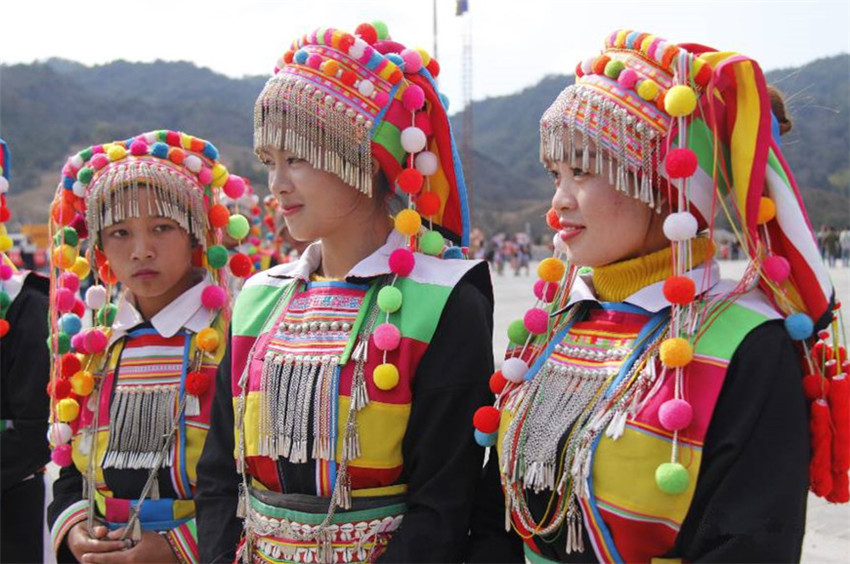
Kuoshi Festival of Lisu Ethnic Minority in Yingjiang County, Dehong
Overview of the Festival
- Chinese Name: 盈江县傈僳族阔时节
- English Name: Kuoshi Festival of Lisu Ethnic Minority in Yingjiang County, Dehong
- Location: Yingjiang County, Dehong
“Kuoshi” in Lisu language means “New Year,” with “kuo” meaning “year” and “shi” meaning “new.” The Kuoshi Festival is the most significant traditional festival for the Lisu people. During Kuoshi, households are busy slaughtering pigs, making sticky rice cakes, and brewing rice wine. They hold ceremonies to bid farewell to the old year and welcome the new one, praying for favorable weather, abundant food, and happiness in the coming year. The festival fills everyone’s heart with a warm sense of joy.
In the grand celebrations of the Kuoshi Festival, the Lisu people’s Daga dance moves and thrills the soul. Performances like climbing knife ladders, walking through fire, and stepping on glass are breathtaking and awe-inspiring.
First Stop: Shimiwadi in Yingjiang
Shimiwadi, also known as Huangcaoba, means “Golden Grassland” in the Lisu language. This picturesque place is located in the Sudian Lisu Township of Yingjiang County, at an altitude of over 1,000 meters, with over 2,000 acres of natural grassland. Shimiwadi is the homeland of clouds, the source of mist, and a paradise for colorful clouds. The plain is dotted with cattle and horses, unique trees, meandering rivers, and gently rolling terrain surrounded by hills. It blooms in spring, shades in summer, fruits in autumn, and greens in winter, resembling a utopia and serving as an ideal destination for tourists.

Recently, Shimiwadi remains frosty in the early morning, maintaining its springtime romance. Departing from the plains at 6 a.m., visitors can witness its beauty upon arrival. For those who find early mornings challenging, staying overnight in a stargazing tent in Shimiwadi offers the experience of waking up to a white world outside the door. After a day of play, the sunset casts an orange glow over the night, and the sky fills with stars as you sit by a bonfire, enjoying the tranquility far from the city. If you haven’t visited Shimiwadi yet, take this festival as an opportunity!
Second Stop: Lisu Ancient Village of Xiamongpi
Xiamongpi is a Lisu ethnic minority village with bamboo fences, bamboo and wooden buildings, and small bridges over flowing water, exuding a strong Lisu cultural atmosphere. Upon entering the village, mysterious “sacred pillars” with “holy bowls” atop line both sides of the road, invoking a sense of awe and reverence. On the left side of the village square, a circular hill hosts the more mysterious and ancient altar “Shimiwadi Sacred Pillars,” adorned with goat and cow heads, eerie and daunting. Scattered “stone inscriptions” on the hillsides, pathways, and courtyards tell stories of this ancient people with their intriguing, rustic, and vigorous carvings.
Third Stop: Shenhuguan Ruins
After enjoying natural beauty, immerse yourself in history and culture. At the junction of Sudian Township and Zhanxi Town in Yingjiang County stands the Shenhuguan Ruins. Shenhuguan, one of the eight passes built during the Ming Dynasty’s Wanli reign to defend against invasions, was known locally as “Laoguancheng.” Controlling key routes like Chashan, Guyong, Weimian, and Yixi, it was a strategic point. According to “Tengyue Prefecture Annals,” the fort was thirty zhang around, three zhang high, with a five-zhang-four chi tall tower and an official residence. The ancient gate tunnel was seven zhang deep, one zhang wide, and one zhang three chi high, with nine chi high walls on either side. In 1986, the site was listed as a protected cultural relic in Yingjiang County, with a commemorative stone stele. In 2009, it became a protected cultural relic of Dehong Prefecture. Today, remnants of bricks and stones from the once-mighty pass still tell its historical tales.

From its construction in the twenty-second year of Wanli to today, Shenhuguan has stood for over four hundred years. Despite its current ruins, the remaining walls and bricks continue to narrate its history, singing timeless patriotic songs.
Besides festive activities, historical culture, and scenic beauty, the local cuisine will captivate you! Yingjiang’s culinary delights include Lisu-style chicken porridge, bamboo rice chicken, new rice, fermented fish, pickled vegetables, stinky bamboo shoots, buckwheat jelly, and Jeep-cooked eggs.

 7 Days GolfingTour
7 Days GolfingTour
 8 Days Group Tour
8 Days Group Tour
 8 Days Yunnan Tour
8 Days Yunnan Tour
 7 Days Shangri La Hiking
7 Days Shangri La Hiking
 11 Days Yunnan Tour
11 Days Yunnan Tour
 6 Days Yuanyang Terraces
6 Days Yuanyang Terraces
 11 Days Yunnan Tour
11 Days Yunnan Tour
 8 Days South Yunnan
8 Days South Yunnan
 7 Days Tea Tour
7 Days Tea Tour
 8 Days Muslim Tour
8 Days Muslim Tour
 12 Days Self-Driving
12 Days Self-Driving
 4 Days Haba Climbing
4 Days Haba Climbing
 Tiger Leaping Gorge
Tiger Leaping Gorge
 Stone Forest
Stone Forest
 Yunnan-Tibet
Yunnan-Tibet
 Hani Rice Terraces
Hani Rice Terraces
 Kunming
Kunming
 Lijiang
Lijiang
 Shangri-la
Shangri-la
 Dali
Dali
 XishuangBanna
XishuangBanna
 Honghe
Honghe
 Kunming
Kunming
 Lijiang
Lijiang
 Shangri-la
Shangri-la
 Yuanyang Rice Terraces
Yuanyang Rice Terraces
 Nujiang
Nujiang
 XishuangBanna
XishuangBanna
 Spring City Golf
Spring City Golf
 Snow Mountain Golf
Snow Mountain Golf
 Stone Mountain Golf
Stone Mountain Golf














